-
ORIGINAL ARTICLE01-30-2023
Adverse dermatoneurological events and impacts on daily activities of patients with gastrointestinal neoplasms undergoing chemotherapy
Revista Brasileira de Enfermagem. 2023;76(1):e20220161
Abstract
ORIGINAL ARTICLEAdverse dermatoneurological events and impacts on daily activities of patients with gastrointestinal neoplasms undergoing chemotherapy
Revista Brasileira de Enfermagem. 2023;76(1):e20220161
DOI 10.1590/0034-7167-2022-0161
Views0ABSTRACT
Objective:
to associate the presence and grading of adverse dermatoneurological events (peripheral neuropathy and hand-foot syndrome) and the interference in the activities of daily living of patients with gastrointestinal neoplasms undergoing systemic antineoplastic treatment.
Method:
this is a longitudinal, prospective study, using instruments to assess hand-foot syndrome and peripheral neuropathy.
Results:
there were 36 patients: 66.7% diagnosed with colon cancer and 83.2% on combination therapy. From cycle 5 onwards, all of them had hand-foot syndrome, with a majority of grade 1, unrelated to interference in activities of daily living. Regarding peripheral neuropathy, there was a moderate to strong correlation from cycle 1 of treatment.
Conclusion:
peripheral neuropathy negatively affects activities of daily living. The monitoring of dermatoneurological events by oncology nurses contributes to the clinical practice of nursing and subsidizes the development of advanced practice in the country.
Keywords:Activities of Daily LivingAdverse EventsAntineoplasticGastrointestinal NeoplasmsNursing OncologySee more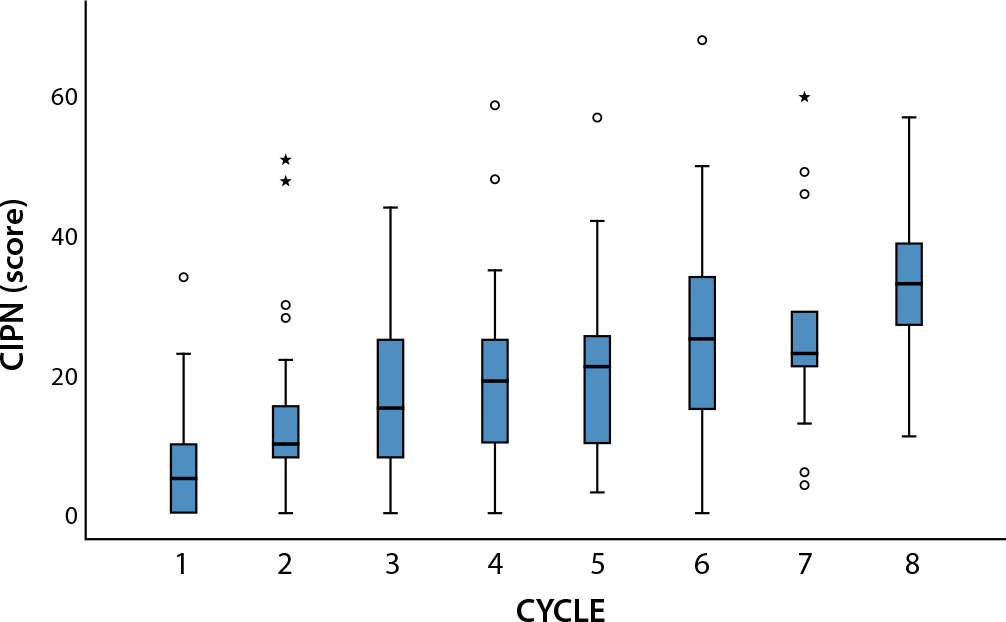
-
ORIGINAL ARTICLE01-30-2023
Pressure injury prevention in older people: construction and validation of an instrument for caregivers
Revista Brasileira de Enfermagem. 2023;76(1):e20210930
Abstract
ORIGINAL ARTICLEPressure injury prevention in older people: construction and validation of an instrument for caregivers
Revista Brasileira de Enfermagem. 2023;76(1):e20210930
DOI 10.1590/0034-7167-2021-0930
Views0ABSTRACT
Objectives:
to construct and validate an instrument to assess the knowledge, attitudes, and practices related to pressure injury prevention among caregivers of institutionalized older people.
Methods:
this is a three-stage methodological study that consisted of instrument construction, analysis by experts, and semantic and appearance analysis, with 78 participants, observing the validation process steps for psychometric instruments in the criteria of clarity and relevance.
Results:
in the Delphi I round, the validity index of the general content in the clarity criterion was 0.66, in relevance 0.85, and the Kappa value was >0.76. In Delphi II, clarity was 0.95, relevance 1.00, and the Kappa value was >0.97.
Conclusions:
this is a valid instrument in terms of content and appearance, which allows further analysis of its reliability for the measurement of the constructs for which it is intended. Therefore, it can be considered a tool for care management in pressure injury prevention.
Keywords:AttitudesCaregiversHealth KnowledgeNursing Methodology ResearchPracticePressure UlcerValidation StudySee more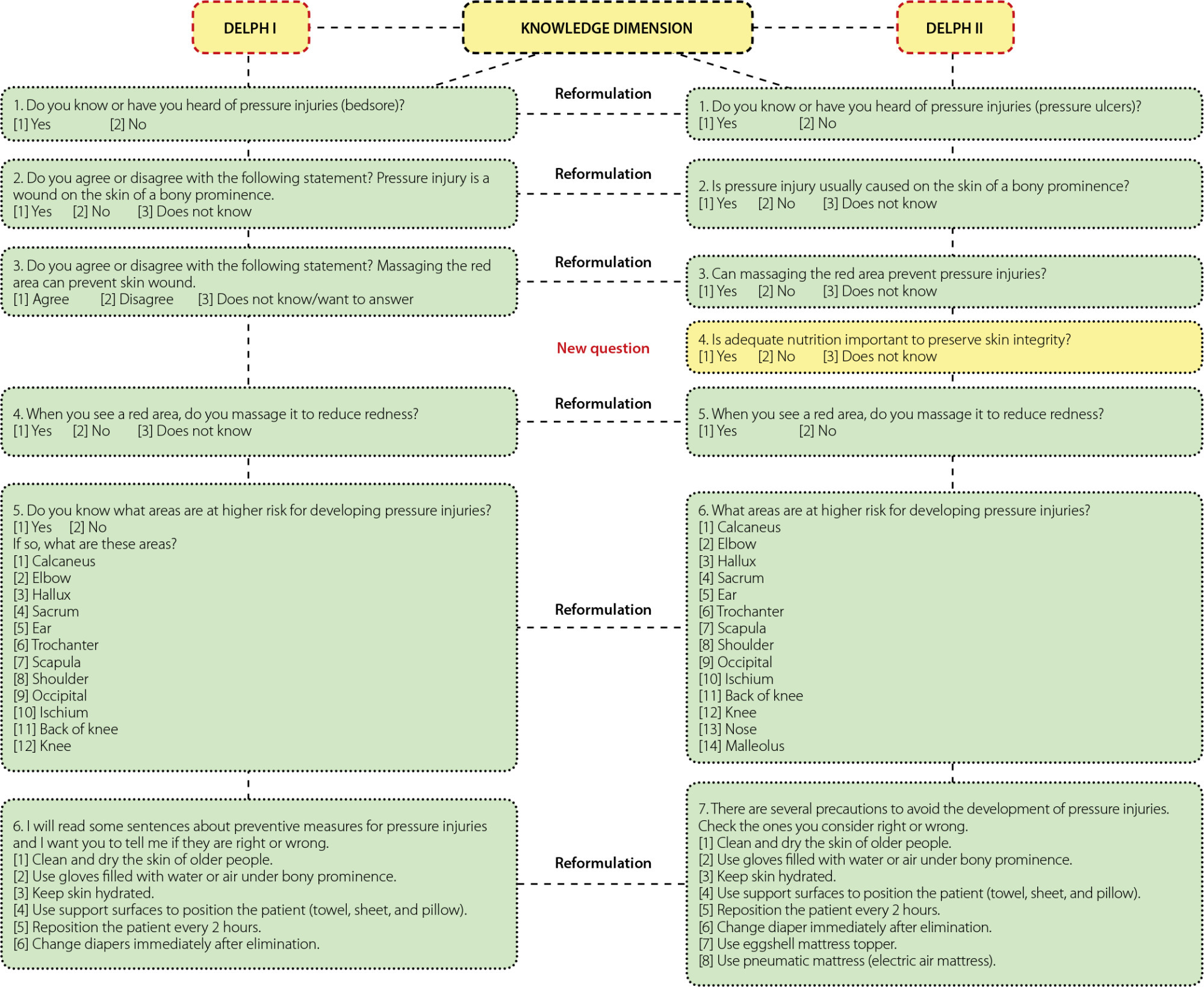
-
ORIGINAL ARTICLE01-30-2023
Educational material production and validity: educational instrument for home care for premature newborns
Revista Brasileira de Enfermagem. 2023;76(1):e20210648
Abstract
ORIGINAL ARTICLEEducational material production and validity: educational instrument for home care for premature newborns
Revista Brasileira de Enfermagem. 2023;76(1):e20210648
DOI 10.1590/0034-7167-2021-0648
Views0ABSTRACT
Objective:
to produce and validate a booklet, based on Jean Watson’s Theory, on home care for premature newborns, based on caregivers’ experiences.
Method:
a methodological study, developed in the following stages: diagnosis of knowledge needs about home care; survey of scientific content; educational material production; and validity by judges/experts.
Results:
the literature review resulted in 19 articles. The main themes (breastfeeding, bath care, bond building, infection prevention and support network) were listed for producing the booklet “Booklet for Premature Newborns: Demystifying Home Care”. The booklet content and appearance received the overall Content Validity Index of 0.85, considered suitable within the scientific rigor of validity.
Final considerations:
the booklet produced and validated is an educational material whose main role is to provide knowledge and awaken caregivers’ autonomy in providing home care to newborns.
Keywords:Educational and Promotional MaterialsHealth EducationInfantIntensive Care UnitsNeonatalPrematureValidation StudySee more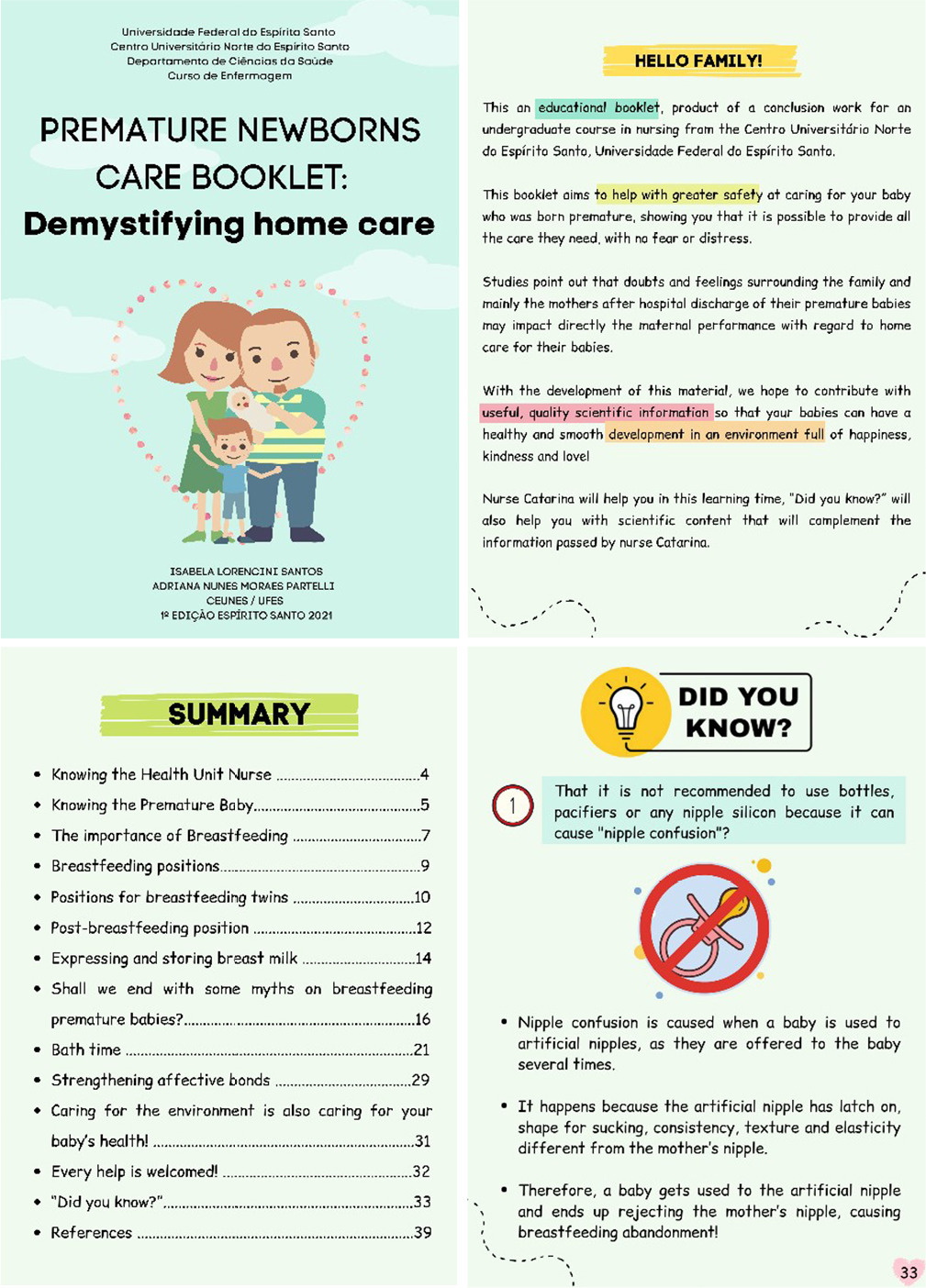
-
ERRATUM01-06-2023
ERRATUM
Revista Brasileira de Enfermagem. 2023;76(2):e2023n2e01
Abstract
ERRATUMERRATUM
Revista Brasileira de Enfermagem. 2023;76(2):e2023n2e01
DOI 10.1590/0034-7167.20237601e01
Views0In the article “Development and validity of an educational folder for pulmonary tuberculosis sputum collection”, with DOI number: , published in Revista Brasileira de Enfermagem, 2023;76(1):e202220194, on page 8:Delete:[…]See more -
ORIGINAL ARTICLE12-16-2023
School Nursing Guide for student health promotion: construction and validity
Revista Brasileira de Enfermagem. 2023;76(1):e20220260
Abstract
ORIGINAL ARTICLESchool Nursing Guide for student health promotion: construction and validity
Revista Brasileira de Enfermagem. 2023;76(1):e20220260
DOI 10.1590/0034-7167-2022-0260
Views0See moreABSTRACT
Objectives:
to describe the process of construction and validity of a School Nursing Guide for student health promotion.
Methods:
a methodological study, carried out from February to December 2021, composed of Convergent Care Research based on Pender’s Health Promotion Model. Based on the literature and dialogue with 11 nurses in the seven online focus groups, actions were constructed. Subsequently, 24 judges assessed content and appearance.
Results:
the guide proposes strategies for developing school nursing practices focusing on health promotion. The Appearance Validity Index ranged from 0.63 to 1.0, and the total was 0.84. The Content Validity Index ranged from 0.95 to 1.0, and the total was 0.997.
Conclusions:
the guide incorporated the needs of young people recognized by professionals, and the assessment phase confirms its validity, and can be used in the context of practice with young people.
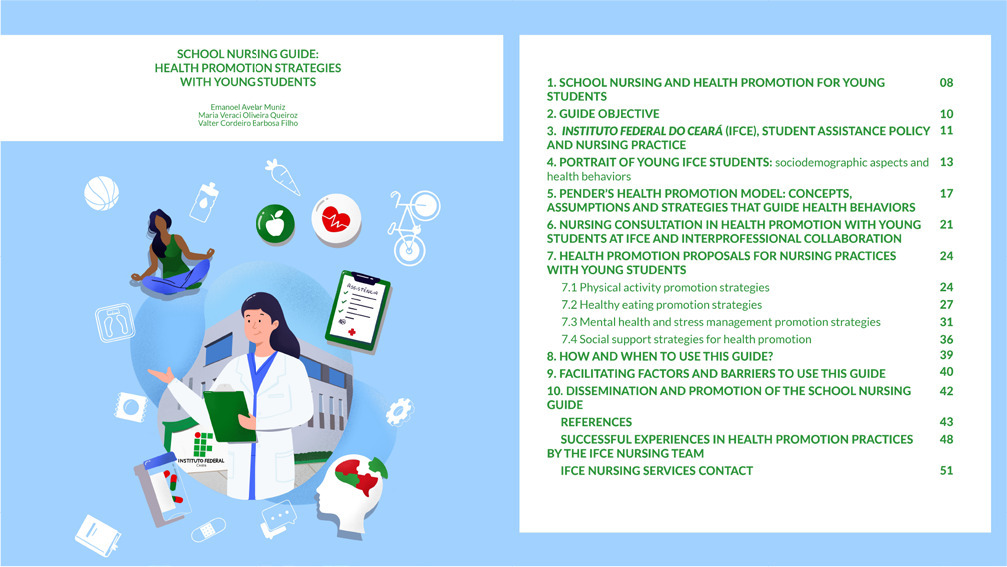
-
ORIGINAL ARTICLE12-16-2023
Cardiac anxiety in the perioperative period of patients undergoing cardiac surgical procedures: an observational study
Revista Brasileira de Enfermagem. 2023;76(1):e20220250
Abstract
ORIGINAL ARTICLECardiac anxiety in the perioperative period of patients undergoing cardiac surgical procedures: an observational study
Revista Brasileira de Enfermagem. 2023;76(1):e20220250
DOI 10.1590/0034-7167-2022-0250
Views0See moreABSTRACT
Objective:
to compare cardiac anxiety symptoms in patients undergoing coronary artery bypass graft and valve surgery repair in the preoperative period, on the day of hospital discharge and on the first return visit after hospital discharge.
Methods:
an observational study, carried out in inpatient units and in outpatient clinic of a university hospital. Data were collected through interviews. Cardiac anxiety symptoms were assessed using the Cardiac Anxiety Questionnaire.
Results:
we observed the effect of time on cardiac anxiety symptoms of patients undergoing coronary artery bypass graft in the total score and in the “Avoidance” domain at discharge and at the first return visit. In patients undergoing valve repair surgery, the effect of time on symptoms was observed only in the first return visit, when compared with the preoperative period.
Conclusion:
the findings revealed increased cardiac anxiety symptoms in the postoperative period, discharge and first return, when compared to the preoperative period.
-
ORIGINAL ARTICLE12-16-2023
Elderly Mortality due to Ambulatory Care Sensitive Conditions and Primary Health Care Coverage in the Federal District
Revista Brasileira de Enfermagem. 2023;76(1):e20220170
Abstract
ORIGINAL ARTICLEElderly Mortality due to Ambulatory Care Sensitive Conditions and Primary Health Care Coverage in the Federal District
Revista Brasileira de Enfermagem. 2023;76(1):e20220170
DOI 10.1590/0034-7167-2022-0170
Views0See moreABSTRACT
Objectives:
To describe the mortality coefficients of elderly due to primary care sensitive conditions, from 2008 to 2018, and determine its association with the coverage of the Primary Health Care (Family Health Strategy and Basic Care models) in the Federal District.
Methods:
Ecological time series of mortality in Federal District elderly, from 2008 to 2018. The Poisson regression model was applied, considering as significant those with p<0.05, with a CI of 95%.
Results:
There were 70,503 deaths. There was a decrease in the risk of death of elders due to cardiovascular diseases and diabetes. Higher primary care coverage decreased the chance of death by sensitive conditions, both in Basic Care (OR: 0.994, CI: 0.990-0.998) and in the Family Health Strategy (OR: 0.997, CI: 0.995-0.999).
Conclusions:
Primary Care coverage was associated with a lower chance of death of the elderly due to Ambulatory Care Sensitive Conditions, especially in Basic Care.
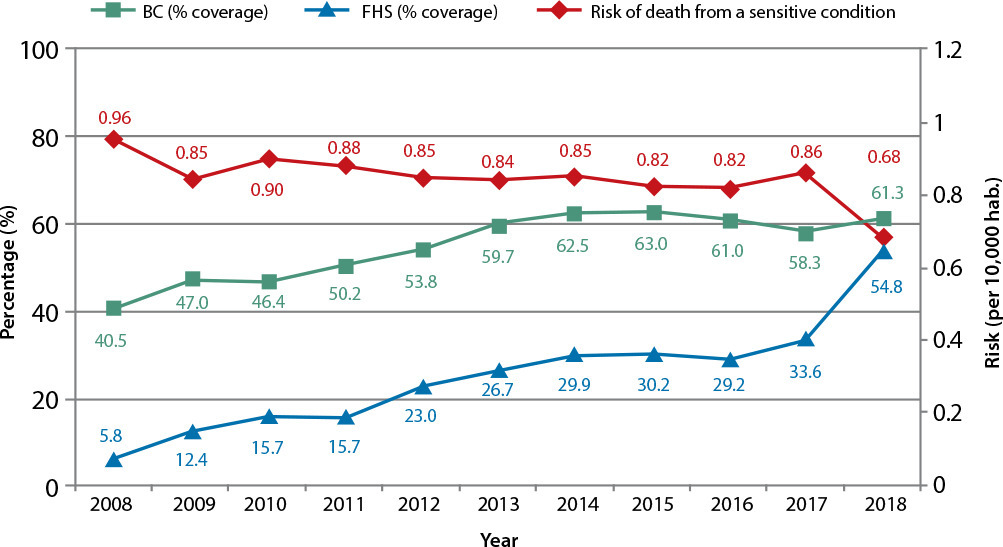
-
REVIEW12-16-2023
Educational interventions in child development and health literacy assumptions: an integrative review
Revista Brasileira de Enfermagem. 2023;76(1):e20220116
Abstract
REVIEWEducational interventions in child development and health literacy assumptions: an integrative review
Revista Brasileira de Enfermagem. 2023;76(1):e20220116
DOI 10.1590/0034-7167-2022-0116
Views0See moreABSTRACT
Objectives:
to analyze scientific evidence in the literature that addresses educational interventions conducted by health professionals on early childhood development in a community context and to identify which health literacy assumptions are present during the implementation of interventions.
Method:
an integrative review in PubMed, CINAHL and Web of Science databases. Of 300 studies found, we selected 11 for the sample.
Results:
health professionals are trained to implement interventions with parents/caregivers to promote child development in community settings. Parents are encouraged to develop an environment that is encouraging and conducive to the development of their children. The main dimensions of health literacy found were access and apply.
Conclusion:
it confirms the importance of training health professionals, with skills and communicative skills to guide parents/caregivers to encourage the development of their children in their family environment with playful and interactive activities.
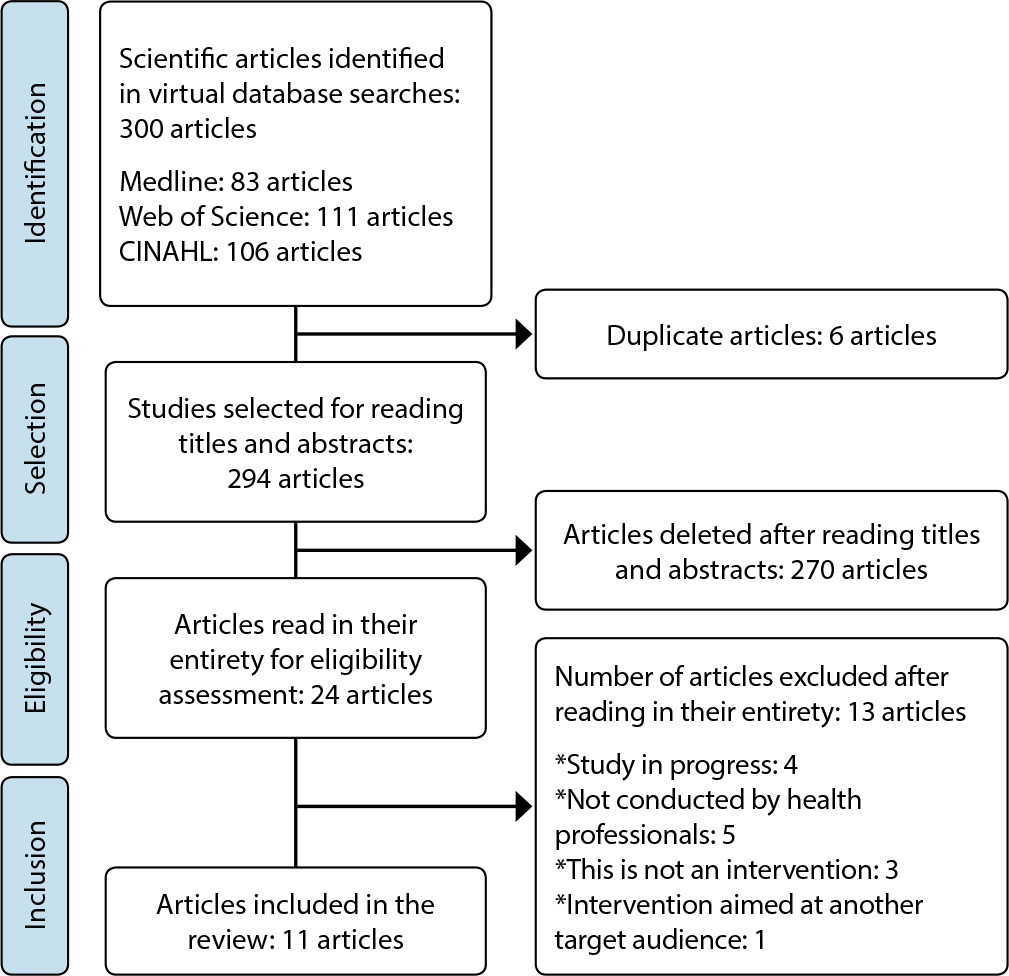
-
ORIGINAL ARTICLE12-13-2024
Nurses’ experience regarding patient safety in mobile pre-hospital care
Revista Brasileira de Enfermagem. 2024;77(5):e20230529
Abstract
ORIGINAL ARTICLENurses’ experience regarding patient safety in mobile pre-hospital care
Revista Brasileira de Enfermagem. 2024;77(5):e20230529
DOI 10.1590/0034-7167-2023-0529
Views0See moreABSTRACT
Objectives:
to understand nurses’ experience regarding patient safety in mobile pre-hospital care.
Method:
a qualitative, exploratory and descriptive study, conducted with nurses active in mobile pre-hospital care services. Semi-structured interviews were conducted, audio-graved and submitted to Bardin’s content analysis.
Results:
from four thematic categories established, nurses reported the care and management skills necessary to work in this service. They demonstrated a commitment to ensuring safe care for patients, staff and spectators. They highlighted the actions taken to prevent and mitigate incidents. However, they based their experiences on practice protocols and individual actions, expressing the need to improve knowledge about patient safety.
Final Considerations:
mobile pre-hospital care nurses’ experience in relation to patient safety was limited, suggesting the need for training on the subject, alignment of work processes and implementation of strategies, aiming to guarantee safe care.
-
ORIGINAL ARTICLE12-13-2024
Repercussions of the pandemic on tuberculosis control actions from the perspective of health professionals
Revista Brasileira de Enfermagem. 2024;77(5):e20230477
Abstract
ORIGINAL ARTICLERepercussions of the pandemic on tuberculosis control actions from the perspective of health professionals
Revista Brasileira de Enfermagem. 2024;77(5):e20230477
DOI 10.1590/0034-7167-2023-0477
Views0See moreABSTRACT
Objectives:
to analyze the repercussions of the COVID-19 pandemic on tuberculosis control actions from the perspective of primary health care professionals.
Methods:
this descriptive study with a qualitative approach was conducted from November 2022 to April 2023, using semi-structured interviews with 11 key informant professionals from primary health care units in a Brazilian capital. Data were organized using Atlas.ti 22.0 software and subjected to thematic-categorical content analysis.
Results:
the pandemic scenario caused alterations in the work process, necessitating abrupt adaptations, and led to detrimental impacts on the health of professionals and tuberculosis control actions, which were reduced or discontinued.
Final Considerations:
there was evident unpreparedness and a lack of resources from various governmental levels and health services to handle the public health emergency situation without severe harm to the provision of essential services.
-
Training of Brazilian indigenous nurses: between human rights, valuing diversity and inclusion
Revista Brasileira de Enfermagem. 2024;77(5):e20230430
Abstract
Training of Brazilian indigenous nurses: between human rights, valuing diversity and inclusion
Revista Brasileira de Enfermagem. 2024;77(5):e20230430
DOI 10.1590/0034-7167-2023-0430
Views0See moreABSTRACT
Objectives:
to analyze the possibilities and potential of training indigenous nurses, given the Brazilian Health System (SUS), understanding the relationships between education and health.
Methods:
theoretical-reflective study, based on scientific literature, aligned with the experience, critical thinking of its authors and the Sustainable Development Goals in Brazil.
Results:
this text articulates three axes: Potential for including indigenous students in nursing training; Paths to achieving equity through inclusion and retention policies for indigenous students at different levels; and Implications of this for the SUS and global health.
Final Considerations:
indigenous students, beneficiaries of affirmative actions, face challenges of inclusion and retention in public universities that directly impact their academic training. Added to this are the difficulties identified in basic education, professor training and implementation of permanence policies, with consequences for services and training at other levels.
-
ORIGINAL ARTICLE12-13-2024
Interobserver agreement in Reception and Risk Stratification in Obstetrics implementation
Revista Brasileira de Enfermagem. 2024;77(5):e20230361
Abstract
ORIGINAL ARTICLEInterobserver agreement in Reception and Risk Stratification in Obstetrics implementation
Revista Brasileira de Enfermagem. 2024;77(5):e20230361
DOI 10.1590/0034-7167-2023-0361
Views0See moreABSTRACT
Objectives:
to analyze interobserver agreement in the Reception and Risk Stratification in Obstetrics protocol implementation.
Methods:
a cross-sectional study carried out during Reception and Risk Stratification in Obstetrics implementation, conducted in a tertiary hospital in southern Brazil with 891 participants in January 2020. Descriptive and interobserver agreement analysis was carried out using the Kappa coefficient in the risk stratification assigned by the triage nurse and reviewed by the researcher.
Results:
around half of the calls (55.6%) were stratified as not very urgent (green), followed by urgent (yellow) (31.8%), very urgent (orange) (9.3%), not urgent (blue) (3.4%) and no emerging stratification (red). Agreement analysis of revised stratification found Kappa values of 0.20 (blue), 0.54 (green), 0.77 (yellow) and 0.80 (orange).
Conclusions:
most appointments were non-urgent. The agreement analysis between the revised and assigned risk stratification revealed greater interobserver agreement as the priority level increased.
-
ORIGINAL ARTICLE12-13-2024
Adaptation and implementation of a Nursing care protocol for children in the Amazon Region
Revista Brasileira de Enfermagem. 2024;77(5):e20230245
Abstract
ORIGINAL ARTICLEAdaptation and implementation of a Nursing care protocol for children in the Amazon Region
Revista Brasileira de Enfermagem. 2024;77(5):e20230245
DOI 10.1590/0034-7167-2023-0245
Views0See moreABSTRACT
Objectives:
to describe the process of implementing an adapted protocol for pediatric nursing care in a health unit located in a municipality in the Amazon Region.
Methods:
methodological research conducted in a basic health unit with four family health teams in the state of Rondônia, involving seven nursing professionals. Data collection occurred between October 2020 and April 2022, following the research phases: situational diagnosis, exploratory phase, protocol definition, implementation, and evaluation.
Results:
the outcome was the adaptation and implementation of a nursing care protocol for children.
Final Considerations:
the adaptation and implementation process can be an effective approach to improving care, strengthening nursing as a profession with a solid foundation in scientific and clinical evidence. This facilitates early problem identification and appropriate guidance, leading to better health outcomes for children.
-
ORIGINAL ARTICLE12-13-2024
Nurses’ experiences in caring for people with mental health problems hospitalized due to clinical comorbidities
Revista Brasileira de Enfermagem. 2024;77(5):e20230136
Abstract
ORIGINAL ARTICLENurses’ experiences in caring for people with mental health problems hospitalized due to clinical comorbidities
Revista Brasileira de Enfermagem. 2024;77(5):e20230136
DOI 10.1590/0034-7167-2023-0136
Views0See moreABSTRACT
Objectives:
to understand nurses’ experiences in caring for people with mental health problems hospitalized due to clinical comorbidities in non-psychiatric Inpatient Units.
Methods:
qualitative study, guided by Alfred Schutz’s social phenomenology. Sixteen phenomenological interviews were conducted. The content was analyzed and discussed based on the literature, through the composition of three categories of analysis.
Results:
three categories emerged in the study: Challenges in care faced by nurses; Fragmented care action; and Ideal care. The disarticulation of the clinic was revealed, as described by nurses, showing care as an action far removed from the comprehensiveness of a person. Nurses’ performance is guided predominantly by biomedical reference, disregarding appreciation of subjectivity.
Final Considerations:
it was observed that nurses attribute the responsibility for patient care to factors external to their life-world, when, in fact, these aspects should be components that help them in comprehensive care construction.
-
REVIEW11-29-2024
Assessment of knowledge in oncology about care for transgender people: a scoping review
Revista Brasileira de Enfermagem. 2024;77:e20230532
Abstract
REVIEWAssessment of knowledge in oncology about care for transgender people: a scoping review
Revista Brasileira de Enfermagem. 2024;77:e20230532
DOI 10.1590/0034-7167-2023-0532
Views0ABSTRACT
Objective:
to identify evidence available in the literature on instruments and methodologies used to assess healthcare professionals’ knowledge about cancer care for the transgender population.
Methods:
a scoping review was conducted in seven databases, including studies that answered the question: what is the healthcare professionals’ level of knowledge about cancer care for the transgender population?
Results:
forty-one articles were selected that dealt specifically with healthcare professionals’knowledge in relation to care for the LGBTQIAPN+ population, especially the transgender population. Eighteen studies assessed patients’ perceptions of professionals’knowledge, whereas other studies used their own assessment tools, considering the global context of LGBTQIAPN+ health.
Conclusions:
there is no tested and validated instrument that assesses the knowledge about the transgender population’s oncological health, highlighting the need to construct and validate an instrument focused on this population’s needs.
Keywords:Health Services for Transgender PeopleNeoplasmsOncologyProfessional TrainingTransgender PeopleSee more
-
EDITORIAL01-01-2015
A Pesquisa em Enfermagem e os novos rumos a partir do SENPE
Revista Brasileira de Enfermagem. 2015;68(4):571-572
Abstract
EDITORIALA Pesquisa em Enfermagem e os novos rumos a partir do SENPE
Revista Brasileira de Enfermagem. 2015;68(4):571-572
DOI 10.1590/0034-7167.2015680401i
Views0Após quase meio século do início da pesquisa em Enfermagem no Brasil, ainda há necessidade de investimentos para considerá-la consolidada. Os seminários nacionais que discutem a investigação nesta área demonstram esta afirmação ao longo de 17 eventos, por seus resultados e participação da categoria de pesquisadores e prestadores de serviço.O 18º Seminário Nacional de Pesquisa […]See more -
REFLECTION01-01-2015
Comprehensive health care: dilemmas and challenges in nursing
Revista Brasileira de Enfermagem. 2015;68(2):333-338
Abstract
REFLECTIONComprehensive health care: dilemmas and challenges in nursing
Revista Brasileira de Enfermagem. 2015;68(2):333-338
DOI 10.1590/0034-7167.2015680221i
Views0See moreABSTRACT
Objective:
this article discusses comprehensive care as a guiding tenet of the Brazilian Unifi ed Health System (SUS), outlining health care practices, especially nursing, and the relationships built by subjects in action by means of different knowledge.
Methods:
this is a theoretical refl ection that aims to propose dimensions of analysis (access to services, reception, links, lines of care, accountability, and responsiveness), with an emphasis on the dilemmas and challenges of nursing. The proposed dimensions analyze the production of care and its political and technical aspects.
Conclusion:
care should be the focus of all health care work, bearing in mind that intervention for technological action of each profession goes beyond the core of isolated knowledge, as is the case of nursing, which is connected to other professional practices, and can peruse other territories that operate through relational technologies, entering into the world of the needs of users and families.
-
REVIEW01-01-2015
Gender and violence against women in nursing literature: a review
Revista Brasileira de Enfermagem. 2015;68(2):325-332
Abstract
REVIEWGender and violence against women in nursing literature: a review
Revista Brasileira de Enfermagem. 2015;68(2):325-332
DOI 10.1590/0034-7167.2015680220i
Views0See moreABSTRACT
Objective:
considering the potential of nursing to expand understanding on this theme, this study aims to learn what is being published on gender and violence against women in the main Brazilian nursing journals.
Method:
an integrative review of online publications between 2000 and 2012 was conducted. Of the 138 articles selected, 25 addressed gender and violence against women as social constructs.
Results:
there was a predominance of qualitative approaches (60%), empirical research (60%), academic (100%), authors who were nurses (96%), spousal violence (32%) and domestic violence (20%). Violence against women in the light of gender was associated in only 32% of the articles.
Conclusion:
there is a need for increased studies in partnership with the public health care service, and to expand discussions on the dynamics of power and resistance, which are the basis of the concept of gender.
-
RESEARCH01-01-2015
Nasal colonization in nursing professionals from units specialized in HIV/AIDS
Revista Brasileira de Enfermagem. 2015;68(2):320-324
Abstract
RESEARCHNasal colonization in nursing professionals from units specialized in HIV/AIDS
Revista Brasileira de Enfermagem. 2015;68(2):320-324
DOI 10.1590/0034-7167.2015680119i
Views0See moreABSTRACT
Objective:
to investigate the presence of microorganisms in the nostrils of the nursing professionals of a Brazilian teaching hospital.
Method:
cross-sectional study in two inpatient units specialized in HIV/AIDS. Nasal secretion samples of nursing professionals were collected in one month. The samples were processed at the microbiology laboratory of the institution and analyzed using the Statistical Package for the Social Sciences (SPSS) software, version 19.0. Ethical aspects were abided.
Results:
from the 73 members of the nursing staff, samples of nasal secretions were collected from 61 (80.2%). Six types of microorganisms were isolated in 22 (41.0%) positive cultures. It is noteworthy that Staphylococcus aureus accounted for 22.9%, four of them oxacillin-resistant (MRSA).
Conclusion:
Staphylococcus aureus microorganism accounted for the largest prevalence in individuals of this study.
-
RESEARCH01-01-2015
Evaluation of nursing students about learning with clinical simulation
Revista Brasileira de Enfermagem. 2015;68(2):311-319
Abstract
RESEARCHEvaluation of nursing students about learning with clinical simulation
Revista Brasileira de Enfermagem. 2015;68(2):311-319
DOI 10.1590/0034-7167.2015680218i
Views0See moreABSTRACT
Objective:
to describe the contributions of clinical simulation for learning cognitive and procedural attributes through debriefi ng, from the perspective of nursing students.
Method:
descriptive exploratory study. Twenty nursing undergraduate students from a university in the interior of the state of São Paulo participated in this study. Data collection was performed at the debriefi ng stage. Student’s perceptions about the simulation, positive aspects and what they could have done differently were registered. The students’ statements were grouped according to the central themes and the framework of Bardin’s content analysis (2011) and were analyzed using descriptive statistics.
Results:
enhancement of active, critical and refl ective learning (47.5%) was identifi ed due to the closeness to reality in nursing care (20.3%), manifestation of feelings experienced during the simulation (15.3%) and composition of the scenario (15.3%).
Conclusion:
the clinical simulation followed by debriefi ng promotes the understanding of the link between action and achievements in learning.
-
RESEARCH01-01-2015
Risk assessment of patient falls while taking medications ordered in a teaching hospital
Revista Brasileira de Enfermagem. 2015;68(2):305-310
Abstract
RESEARCHRisk assessment of patient falls while taking medications ordered in a teaching hospital
Revista Brasileira de Enfermagem. 2015;68(2):305-310
DOI 10.1590/0034-7167.2015680217i
Views0See moreABSTRACT
Objective:
to stratify prescribed medication in a fall risk scale, identifying subgroups of drugs and inpatient units with higher risk of falls.
Method:
retrospective study on prescription order forms given by medical clinic, surgical clinic, and general intensive care unit. Risk factors under consideration: 1) orthostatic hypotension; 2) arterial hypotension; 3) arterial hypertension; 4) bradycardia; 5) psychomotor agitation; 6) mental confusion; 7) dizziness; 8) drowsiness/sedation; 9) reduced eyesight; 10) seizures; 11) atonia/dystonia/muscle weakness; 12) hypoglycemia; 13) urgent urination and 14) urgent defecation/diarrhea. Risk levels adopted: 0: 0 factor; I: 1-2 factors; II: 3-5 factors; III: 6-9 factors; IV: 10-14 factors.
Results:
3893 drugs were analyzed and stratifi ed in levels: 0 22.7%; I 33.5%; II 28%; III 15.1%; IV 0.7%. Levels III and IV more often refer to drugs for stomach acid disorders, 22.6%, and psycholeptics, 100%.
Conclusion:
knowing the risk factors associated with medication may help prevent and reduce falls, especially when therapeutic regimens cannot be modifi ed.
-
RESEARCH01-01-2015
Knowledge and practice of the nurse about leprosy: actions of control and elimination
Revista Brasileira de Enfermagem. 2015;68(2):297-304
Abstract
RESEARCHKnowledge and practice of the nurse about leprosy: actions of control and elimination
Revista Brasileira de Enfermagem. 2015;68(2):297-304
DOI 10.1590/0034-7167.2015680216i
Views0See moreABSTRACT
Objective:
to assess the knowledge and practice of primary health care nurses about control and elimination actions of leprosy.
Method:
evaluation study with qualitative approach, using the Discourse of the Collective Subject, data were collected through semi-structured interviews conducted with 16 nurses.
Results:
the data collected revealed that health professionals have suffi cient knowledge about the National Policy on Control and Elimination of Leprosy (NPCEL) and that the main actions preconized were applied, however, notifi cation of suspected or confi rmed cases and social reintegration of the patient were not mentioned.
Conclusion:
keeping patients in treatment, overload of work, lack of interdisciplinarity and treatment performed at other locations outside of the community were diffi culties reported by professionals. Nurses know the actions addressed at assistance of leprosy patients, however, the study points to the need for a practice which is more aligned to what advocates NPCEL.
-
RESEARCH01-01-2015
Weaknesses of vaccine storage in Primary Healthcare Centers
Revista Brasileira de Enfermagem. 2015;68(2):291-296
Abstract
RESEARCHWeaknesses of vaccine storage in Primary Healthcare Centers
Revista Brasileira de Enfermagem. 2015;68(2):291-296
DOI 10.1590/0034-7167.2015680215i
Views0See moreABSTRACT
Objective:
assessment through qualitative approach of vaccine storage in Primary Healthcare Centers.
Method:
assessment study of qualitative approach in which 30 interviews were conducted with nurses, nursing technicians or assistants and technical reference in immunization, in 12 vaccine rooms that had 100% of the structural criteria evaluated. Recorded testimonials of the subjects were organized and analyzed using thematic Content Analysis.
Results:
the assessment pointed to absence of knowledge on the parts of nurses and nursing technicians and assistants with respect to the effects of low temperature on vaccines. Barriers were also encountered in relation to the supervision of nurses in the vaccine room activities and in relation to the knowledge needed by workers to care for preservation of vaccines.
Conclusion:
vaccine storage is inadequate and may compromise the quality of the immunobiologicals dispensed to the populace.
Search
Search in:
Nuvem de Tags
Aged (144) Atenção Primária à Saúde (239) COVID-19 (104) Cuidados de Enfermagem (269) Educação em Enfermagem (151) Educação em Saúde (139) Enfermagem (930) Estudos de Validação (131) Health Education (144) Idoso (208) Mental Health (149) Nursing (987) Nursing Care (306) Patient Safety (151) Primary Health Care (284) Qualidade de Vida (104) Quality of Life (106) Saúde Mental (145) Segurança do Paciente (150) Validation Studies (108)



